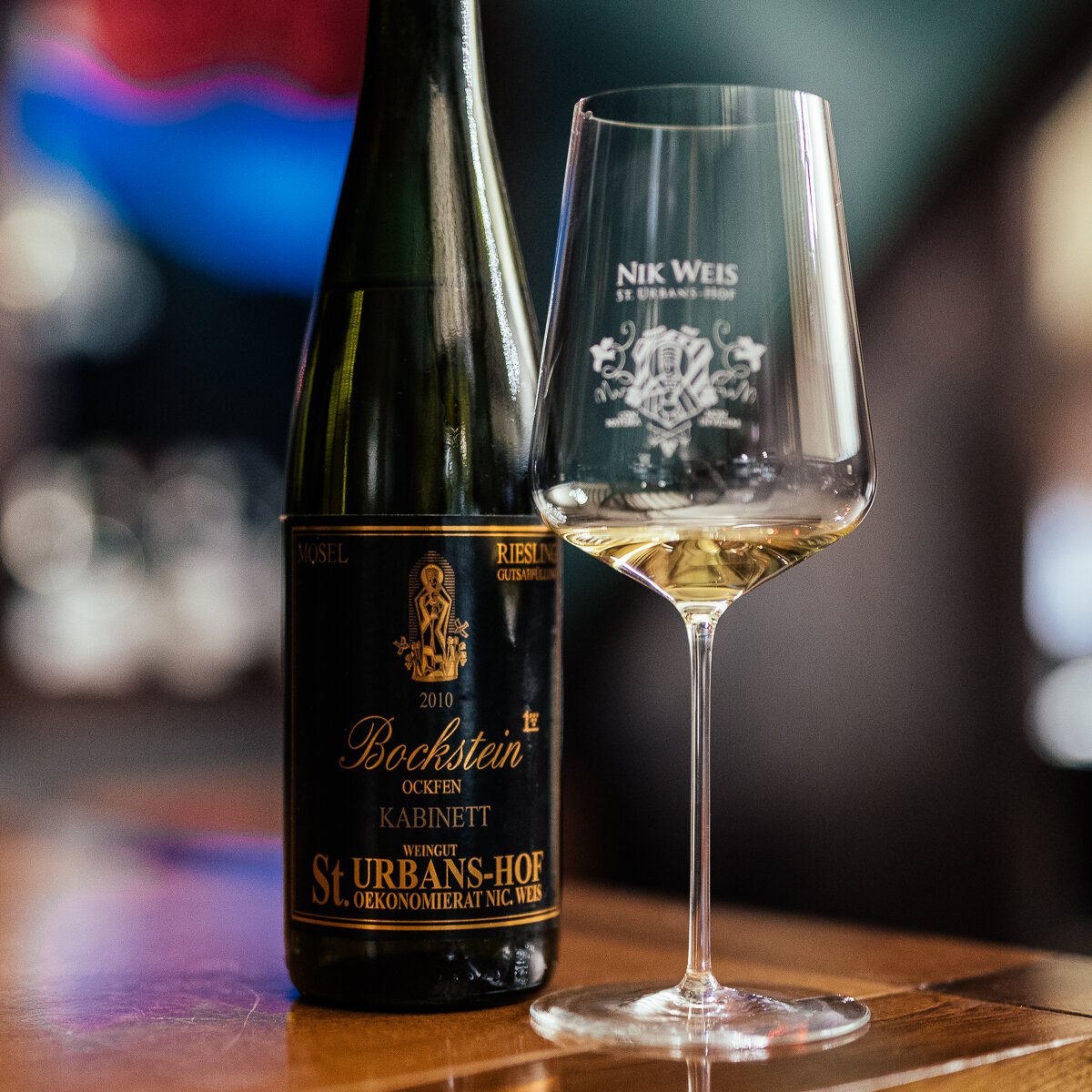We will never look at the beautiful vineyards of “Piesporter Goldtröpfchen” at the river Moselle the same way. Why? Because we spend a day with Nik Weis. Read everything about this exceptional winemaker, his life task and his great wines in this blog story.
The story is so cool we have to tell it: After the so called “Flurbereinigung” (reallocation of land) of the most important vineyards at the Moselle, many of the mountains were completely reshaped, and after that newly planted. The Piesporter Goldtröpfchen is a typical vineyard with this history. That happened in the 1980s. Only on the very left and very right side of it you can find a different look: very wild, rocks everywhere, old vines.
“I want you to take care of my vineyards”
Nik Weis, very young and enthusiastic, got his hands on a small part of the wild part. Only some vines. And he worked his ass off to make the best wine from that vineyard. Everything manual work, carrying buckets with dung up the rocks. A passion project.
One day an old man showed up to ask who is responsible for this small vineyard and who sacrifices a lot to develop this difficult piece of land to make the best possible quality of wine. The man was Erich Dietzen who owned the rest of the not-reallocated parts of the right Goldtröpfchen vineyard. To cut a long story short: He sold all the rest of the vineyard to Nik – just because he saw a young man with the right attitude towards the vines.
Let’s call it the “Nik attitude”
The story is a very good example for what Nik Weis stands for. He is dedicated to the plants, the vines, their origin, their diversity. The logic is very simple: If you want to make complex wines you need to have complex vineyards – meaning diversity, multiple DNA origins, different ages. Along with this “Nik attitude” as we call it now comes a general respect for the nature, soils and plants in the vineyards.
The background of that goes back to the 1940s and Nik’s grandfather. He not only founded the winery in its todays form. He also founded one of the first private vine nursery schools in Germany, from today still Riesling winemakers from the Moselle and all over the world are supplied with new vines.
Noah’s Ark of the Moselle Riesling
Nik Weis has a life task which is more than impressive. Stepping into his grandfather’s footsteps he wants to preserve the ancient Riesling genetics on the Mosel. For that he traveled all the vineyards along the river. Wood was obtained from very old, well-growing and partially root-proof vines in the entire growing area, from which new clones with the old Riesling genetics emerge. The result of this is a kind of "Noah's Ark of the Moselle Riesling", from which many top winegrowers in Germany source their vines.
The reason for that is simple: In the 1910s and 1920s Rieslings of the Mosel, Saar and Ruwer were the most expensive and best wines in the world. That was the time of vine diversity. In the 50s the vine fretter came and destroyed the diversity. Nik Weis want’s to go back to the old days. And he is on a good way.
A field trial with new vines, whose genetic material originated from plants more than 100 years old, finally yielded a century later, Nik Weis and his vineyard manager, Hermann Jostock, proved that the diversity of Riesling genetics and composition of vineyards leads to far more finesse and higher quality wines.
The proof is in the tasting room
Nik is someone who seems to be an unhurried and comfy person at first glance. But do not underestimate this man: He knows exactly what he wants. The man himself is an encyclopedia on two feet. We couldn’t stop listening to him giving lots of background to knowledge we already had and putting puzzle pieces in the right order to see the full picture. You go out of these conversations feeling smarter and clearer.
What he wanted to do with us was quite obvious: Giving the proof that everything he said is right – in the tasting room with his wines in the glass. And he succeeded. The Rieslings of Nik Weis show great complexity and finesse, they are rich and aromatic starting from the basic up to the top of the portfolio.
Read our Tasting Notes here.
Looking at the fact that Nik Weis produces the third biggest volume of all higher-quality winemakers at the Moselle (after Markus Molitor and Van Volxem) this is an impressive achievement.
You can read all the tasting notes HERE.
Weingut Nik Weis St. Urbans-Hof
Urbanusstraße 16
54340 Leiwen
Germany
Visit website of winemaker Nik Weis.






























